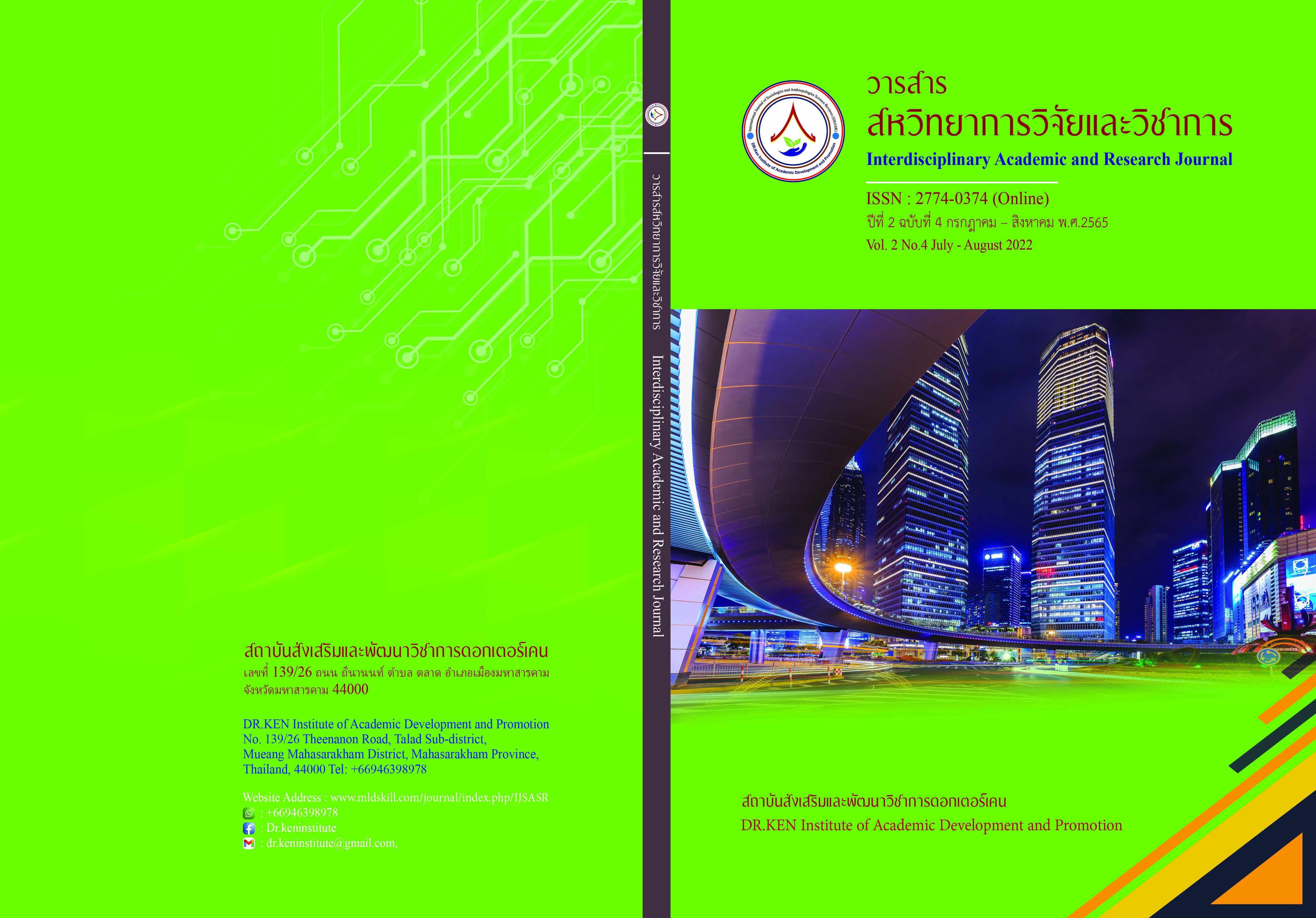Creation of Holistic Happiness Society Community After the COVID 19 Crisis by Integrating the Full Community Participation in Ban Siew Noi, Ban Lao Subdistrict, Chaiyaphum Province
DOI:
https://doi.org/10.14456/iarj.2022.46Keywords:
Community Creation; , Holistic Happiness; , Full Community InvolvementAbstract
Co-living in crowded areas is another risk factor for faster transmission of the virus, where governments around the world have measures in place to treat people living in the health care community. The National Health Commission defines holistic health care as Health is a state of health in which physical, mental, social, and spiritual or intellectual perfection is interconnected as a whole, and health is related to the determinants of health. Therefore, this research aim 1) to study the context of communities affected by the COVID-19 crisis. 2) To study the way to create a holistic happy society community through community participation. And 3) to bring the knowledge gained from the research to be transferred as a guideline for community development, a holistic happiness society returned to the community. This research is participatory action research based on interviews with key informants, namely community leaders in the Ban Siew Noi area, Ban Lao Sub-district, Chaiyaphum Province. The village headman, the village headman's assistant, the Public Health Volunteer (MSU), etc., amounting to 30 people.
The results showed that the context of communities affected by the COVID19 crisis arises from external and domestic problems, which such problems arise and are inherited from the ancestors themselves. Problems encountered are factors that cause social conflicts, such as drugs, migrants fleeing the city, terrorism and transnational crimes, forests and general natural resource destruction of Chaiyaphum Province, and other threats. In the present situation, Chaiyaphum Province is composed of people of different religions, causing more conflicts in communities and society. Dealing with people's conflicts will be based on each area, the conduct of the people depends on the ability and management of both family institutions and social conditions which has a common goal to develop and promote happiness in the household and society in a sustainable way. However, the process of solving problems within a society should be coordinated by people in society who help each other to create something good for their community.
References
กุลธีรา ทองใหญ่, (2562). ปัจจัยที่ส่งผลต่อความสุขของผู้สูงอายุในเขตชุมชนเก้าเส้ง อำเภอเมือง จังหวัดสงขลา. วารสารบริหารธุรกิจเทคโนโลยีมหานคร. 16 (1), 154-179.
บุญชม ศรีสะอาด. (2545). การวิจัยเบื้องต้น.พิมพ์ครั้งที่ 7. กรุงเทพฯ : สุวีริยาสาสน์
ประเวศ วะสี, (2549). การพัฒนาระบบสุขภาพชุมชน สุขภาวะชุมชนเป็นรากฐานของสุขภาวะทั้งมวล. พิมพ์ครั้งที่ 1 กรุงเทพฯ : สำนักงานหลักประกันสุขภาพแห่งชาติ.
ประเวศ วะสี, (2555). ยุทธศาสตร์ชุมชนท้องถิ่น ยุทธศาสตร์ชาติเพื่อการพัฒนาอย่างยั่งยืน. พิมพ์ครั้งที่ 1 กรุงเทพฯ: สำนักงานหลักประกันสุขภาพแห่งชาติ.
ประภาพร สิงห์ทอง และทัตษภร ศรีสุข, (2564). การศึกษาปัจจัยการให้บริการเพื่อพัฒนาคุณภาพสู่ความเป็นเลิศกรณีศึกษา สำนักงานแรงงานจังหวัดนครสวรรค์. วารสารวิทยาการจัดการปริทัศน์, 23 (1), 159- 172.
วาสนา จึงตระกูล. (2562). การประเมินความสุขของบุคลากรโรงพยาบาลสงขลา ประจำปี 2562. วารสารมนุษยศาสตร์และสังคมศาสตร์ มหาวิทยาลัยราชภัฏสงขลา. 2 (2), 105-132.
วิชัย โชควิวัฒน์, (2552). การศึกษาว่าด้วยมิติทั้ง 4 ของสุขภาพ. วารสารวิจัยระบบสาธารณสุข, 3 (3), 323-335.
ศูนย์มานุษยวิทยาสิรินธร (องค์การมหาชน) (2564). กลุ่มชาติพันธุ์ : ไทยโคราช. [Online] สืบค้นจากhttps://www.sac.or.th/databases/ethnic-groups/ethnicGroups/75
สมศรี เรืองแก้ว, ประกอบ ใจมั่น และจิราพร วัฒนศรีสิน, (2563). การพัฒนารูปแบบการดูแลสุขภาพแบบองค์รวมสำหรับนักเรียนมัธยมศึกษา. วารสารสมาคมนักวิจัย, 25 (1), 26-41.
สำนักงานคณะกรรมการสุขภาพแห่งชาติ (สช.), (2563). ‘สู้ภัยโควิด19’ เปลี่ยนวิกฤตเป็น ‘ความยั่งยืนของชุมชน’. [Online] สืบค้นจาก https://www.nationalhealth.or.th/en/node/2234
สำนักงานคณะกรรมการสุขภาพแห่งชาติ (สช.), (2563). “ธรรมนูญสุขภาพตำบล” มาตรการสังคม ช่วยชุมชนสู้ภัยโควิด19. [Online] สืบค้นจาก https://www.nationalhealth.or.th/en/node/1375
สำนักงานสถิติแห่งชาติ. (2565). โครงการสำรวจข้อมูลในเขตพื้นที่สำนักงานสถิติจังหวัดชัยภูมิ. [Online] http://surveybkk.nso.go.th/preview.php?area=00&id_cwt=36#
อมร ลีลารัศมี. (2563). เรื่องน่ารู้เกี่ยวกับโรคติดเชื้อ COVID-19 จากเชื้อไวรัส SARS-CoV-2. [Online] สืบค้นจาก https://tmc.or.th/covid19/download/pdf/tmc-covid19-19.pdf
Best, John W. (1977). Research in Education. 3rd Edition, New Jersey: Prentice-Hall.
Cronbach. Lee J. (1970). Essentials of Psychological Testing. 3rd Edition, New York: Harper & Row.
Downloads
Published
How to Cite
Issue
Section
License
Copyright (c) 2022 Jeeraporn Chankian

This work is licensed under a Creative Commons Attribution-NonCommercial-NoDerivatives 4.0 International License.
Copyright on any article in the Interdisciplinary Academic and Research Journal is retained by the author(s) under the under the Creative Commons Attribution-NonCommercial-NoDerivatives 4.0 International License. Permission to use text, content, images, etc. of publication. Any user to read, download, copy, distribute, print, search, or link to the full texts of articles, crawl them for indexing, pass them as data to software, or use them for any other lawful purpose. But do not use it for commercial use or with the intent to benefit any business.
















.png)


